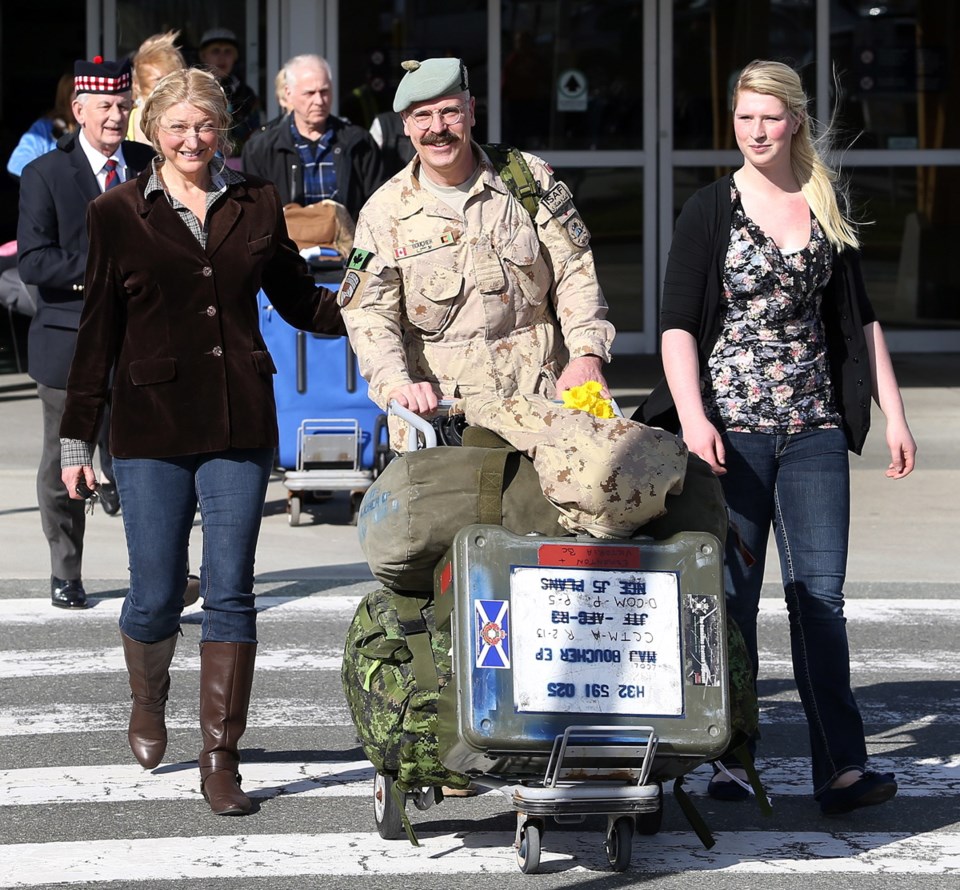 Lt.-Col. Eric Boucher got off the WestJet flight with an army backpack slung over his desert camo fatigues on Wednesday. He kissed his wife, Heather — she had arrived at the Victoria airport clutching daffodils — and gave daughter Katherine a squeeze.
Lt.-Col. Eric Boucher got off the WestJet flight with an army backpack slung over his desert camo fatigues on Wednesday. He kissed his wife, Heather — she had arrived at the Victoria airport clutching daffodils — and gave daughter Katherine a squeeze.
Then Boucher, the very last Canadian soldier to arrive home from Afghanistan, kissed Heather again.
More than 40,000 of our troops had rotated through that country by the time the final contingent of 93 Canadians pulled out of Kabul the other day. Geography and logistics conspired to make Boucher the last one to reach his own bed.
“I don’t know if it’s an honour so much as it’s a relief,” said a tired Boucher. The distinction earned him a smattering of applause from army buddies in the airport arrivals area, where piper Nathan Roberts greeted him with Blue Bonnets — the Canadian Scottish regimental march — and Farewell to Kandahar.
Boucher’s arrival didn’t just mark the end of Canada’s 12-year-plus presence in Afghanistan, though. It also punctuated a withdrawal from the world stage, period.
The exit from Afghanistan leaves Canada with just 600 military personnel abroad, including the 250 aboard Esquimalt-based HMCS Regina in the Arabian Sea and a similar number on four small vessels doing anti-drug patrols in the Caribbean.
Roughly 100 ground troops are scattered on UN missions around the globe, including 14 in South Sudan, seven in Haiti and six in Darfur, as well as 30 on the Sinai Peninsula and three in the Golan Heights, names that carry echoes of Lester Pearson and Canada’s blue-helmeted past.
The current totals pale beside the numbers we used to send abroad when international peacekeeping was part of Canada’s good guy, honest broker identity; more than 125,000 Canadians have served in close to 50 UN missions since the 1956 Suez Crisis. In fact, Victorians Edward Widenmaier and Larry Gollner are among 10 former soldiers, one-time peacekeepers in Cyprus, who are just now returning from a week in that Mediterranean country, where they accompanied Veterans Affairs Minister Julian Fantino on a visit marking the 50th anniversary of Canada’s mission to the divided island. More than 25,000 Canadians served in Cyprus between 1964 and 1993.
Playing global Ned Flanders sometimes clashed with reality; Canada put its troops in harm’s way and tied their hands by sending them into places like Rwanda and Bosnia without clear rules on when they could intervene, or even if they could shoot back when shot at. At the same time, assuming a five-year combat role in Afghanistan proved controversial in Canada.
Today, the question is not so much whether Canadians should be warriors or peacekeepers as whether we have the capacity to mount any sort of international operation at all.
In 2008, the Conservatives unveiled an ambitious plan to re-equip Canada’s rapidly rusting military, but, according to Liberal defence critic Joyce Murray, didn’t match it with a sophisticated vision of what the equipment would be used for. In any case, the plan petered out as the economy faltered. Procurement of big-ticket items like F-35 fighter jets stalled. Military spending in general was sacrificed to the budget gods.
“The equipment and timelines are in a state of chaos,” Murray said Wednesday. (She did not, however, mention naval ship-building plans, which appear on track.) Murray said the Conservatives have lost enthusiasm for things military, as shown by a lack of support for veterans with physical or mental injuries.
Ken Christie, a political scientist at Royal Roads University, believes Canada, a middle power, must think hard about how to use its limited resources. “What Canada does best is things like peacekeeping, human security, providing people with safety and shelter,” he said.
“They can send those missions abroad, but they must have very specific goals.”
Many Canadians see Afghanistan as a mixed bag, he said. What began as a mission to chase out al-Qaida morphed into an exercise in reconstruction and nation-building. Our soldiers did good things there — but at a cost of 158 Canadian dead, more than 1,800 wounded and $18 billion. And to what end? Some figure the Taliban will be back in power by 2017. “What are we going to do then, go back in?”
In the airport, Boucher, who spent the past nine months training Afghan forces, sounded more optimistic. He has seen improvements in that country, he said. “They have the capacity. It remains to be seen what they do with it.”
Then, hand-in-hand with Heather, he headed for the luggage carousel, the last soldier home.



